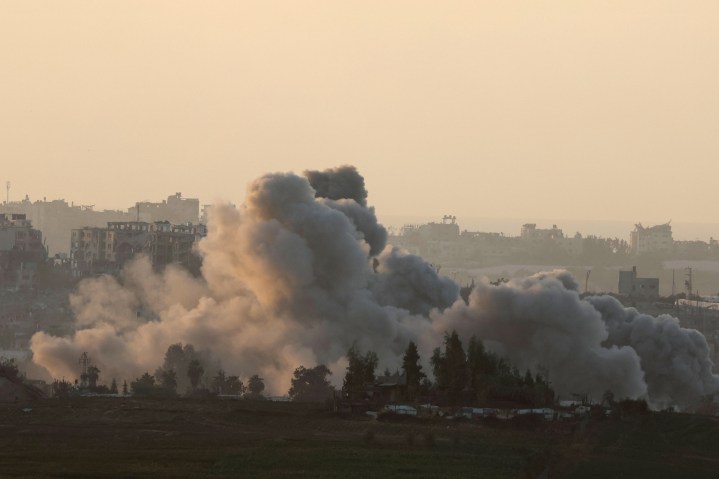MIDDLE EAST CRISIS UPDATE: 8 DECEMBER 2023
Mission to flood Hamas tunnels means months of destruction; Israel blames UN for inadequate aid flow into Gaza

Israel’s military said its mission to destroy an estimated 500km of Hamas tunnels across the Gaza Strip would take months, causing a scale of urban destruction that may prove impossible to reverse.
Israel blamed the United Nations for the inadequate flow of food and other aid into Gaza, deepening a dispute over an evolving humanitarian crisis.
Israel’s central bank brought its unprecedented currency interventions to an almost complete halt in November, as the shekel rebounded in tandem with the rally in US stocks while the war against Hamas stays relatively contained.
Latest developments
- What will happen in Gaza after Israel stops its war on Hamas?
- Israel rebuffs calls to halt Gaza war as forces move south
- Understanding the roots of the Israel-Hamas war: QuickTake
Destroying Hamas tunnels ‘will take months’, says Israel
Israel’s military said its mission to destroy an estimated 500km of Hamas tunnels across the Gaza Strip would take months, causing a scale of urban destruction that may prove impossible to reverse.
The devastating outcome of a drawn-out campaign against Hamas — with air strikes and ground battles continuing alongside the tunnel attacks — is likely to leave many of about 2.2 million Palestinians homeless and a question mark over where they can be rehoused.
In Beit Hanoun, a town of more than 50,000 people in the northern Gaza Strip, a 41km-long Mediterranean enclave run by Hamas, the Israeli military has set about blowing up almost 100 shafts and several dozen tunnels, said Lieutenant-Colonel Amit, who is overseeing their destruction and withheld his surname in line with army rules.
Beit Hanoun was among the places from which Hamas launched its surprise attack on Israel that killed about 1,200 people on 7 October, triggering the ongoing counter-invasion. Hamas is designated a terrorist organisation by the US and European Union.
“The way it is now it’s not liveable,” Amit said of the town in a briefing near Gaza at the Tze’elim military base, where his 252nd Reserve Division is based. “This is not beautiful what we’re doing. There is nothing nice about wars but this is necessary.”
The destruction of tunnels is advancing Israel’s stated aim of dismantling Hamas infrastructure so the group can’t repeat its deadly 7 October assault. At the same time, reducing much of Gaza to rubble — which Hamas-run authorities say has killed at least 16,000 people to date, mostly civilians — is raising international concerns, including in the US.
The inhabitants of Gaza have been driven south by the fighting, but Israel’s campaign has started to move in the same direction. The United Nations has warned that civilians have run out of safe harbours and may need to be displaced into neighbouring countries.
Read More: UN steps up Gaza ceasefire calls with strongest move since 1971
The tunnels, which are used by Hamas to move its militants from one place to another and to store weapons, are mostly located in densely populated areas, Amit said, using a map to illustrate.
Many are booby-trapped, as are houses and roads, meaning that heavy demining equipment such as bulldozers are needed, increasing the extent of the damage.
“Our goal is to hurt Hamas and destroy Hamas as a political and military organisation, but you can see that these shafts are under normal people’s homes,” Amit said, with his talk occasionally punctuated by the roar of fighter jets heading toward Gaza.
The military has so far discovered 800 tunnels across Gaza and destroyed 500 of them, with Beit Hanoun an area of particular focus. Now virtually all the inhabitants have fled the town, of which little is left. Amit is a reservist whose civilian work is in urban renewal, though he says he’s now doing the opposite.
Some of the shafts are 30m, equivalent to the height of a 10-story building. Destroying them is a painstaking process with a considerable amount of explosives required to break down the concrete walls and blast-resistant doors.
Hamas has been building the tunnels since 2008 and “it will take months,” he said. “We will be able to destroy Hamas as a functioning organisation and then the infrastructure will take time.”
Israel has yet to show it has a plan for Gaza after the war. Key allies such as the US have expressed concern about the absence of a long-term strategy, as have key Arab nations.
Israel blames UN for slow aid as Guterres warns of disaster
Israel blamed the United Nations for the inadequate flow of food and other aid into Gaza, deepening a dispute over an evolving humanitarian crisis.
Israel was clearing 250 trucks a day through the Nitzana border crossing between Egypt and Gaza but the UN was unable to process what was arriving and distribute it in Gaza, said Colonel Elad Goren, head of the civil department of the agency overseeing Israeli government activities in Gaza and the West Bank.
“We are allowing hundreds of trucks into Gaza,” he said at a press conference in Tel Aviv on Thursday. “The problem is the capability of the UN. We won’t be the problem, the focus needs to be how much they can collect.”
The UN Office for the Coordination of Humanitarian Affairs said on Wednesday just 80 trucks entered Gaza carrying aid and 69,000 litres of fuel, down from an average of 170 a day during a seven-day truce that ended on 1 December. It blamed a shortage of trucks because many are stranded in Gaza, telecommunications blackouts and staff unable to report to the Rafah crossing because of fighting.
On Thursday, a senior UN official said Israel and Egypt were “much more open” to the idea of opening the Kerem Shalom crossing in the south of Gaza for more aid. The UN was engaged in “daily and nightly” discussions with the two nations that border Gaza, as well as the US, said Martin Griffiths, the United Nations’ head of humanitarian affairs and emergency relief.
“If we get that, it’ll be the first miracle we’ve seen for some weeks,” Griffiths told a briefing. “It will change the nature of humanitarian access.”
UN Secretary-General António Guterres used his most powerful diplomatic tool on Wednesday, writing to the Security Council to urge a ceasefire to halt a situation in Gaza that is “fast deteriorating into a catastrophe”.
The letter was sent under Article 99 of the UN’s charter, which allows the secretary-general to bring any issue seen as threatening international peace to the Security Council’s attention, the UN said. It was the first time it’s been used in five decades.
Bank of Israel dials back interventions it started after attacks
Israel’s central bank brought its unprecedented currency interventions to an almost complete halt in November, as the shekel rebounded in tandem with the rally in US stocks while the war against Hamas stays relatively contained.
The Bank of Israel said on Thursday that it sold just $338-million in foreign exchange last month, a sharp drop from the $8.2-billion it used to defend the local currency in October. The shift in sentiment has taken some pressure off its reserves, which grew by nearly $7-billion last month to more than $198-billion, largely as a result of a currency revaluation.
The shekel gained more than 8% against the dollar in November, making it the best performer among a basket of 31 major currencies tracked by Bloomberg. It appreciated by about 0.3% on Thursday, near its strongest level since August.
The financial defences erected by the Bank of Israel have withstood a selloff that began after the conflict erupted on 7 October, with policymakers still waiting for markets to stabilise and refraining from interest-rate cuts.
In the immediate aftermath of the attack from Gaza that killed 1,200 people, authorities deployed a massive support package that included a pledge to sell as much as $30-billion of reserves and provide up to $15-billion via swaps.
That commitment, “combined with the measured war scenarios published later by the central bank and the Finance Ministry, had a calming effect on the shekel”, said Ronen Menachem, chief markets economist at Mizrahi Tefahot Bank.
US working on Israel-Saudi ties despite Gaza war, says top envoy
The US was continuing to work on the normalisation of ties between Israel and Saudi Arabia, and the ongoing war in the region gave a new reason to aspire toward peace, said an adviser to President Joe Biden.
The Biden administration was working not just on Saudi-Israel relations but was also focusing on broader regional integration, the White House’s energy security adviser, Amos Hochstein, said at the Atlantic Council Global Energy Forum in Dubai.
“This conflict should be a doubling-down on reminding us that if we don’t go toward regional integration, peace and security, this is the alternative,” he said. DM
Read more in Daily Maverick: Israel-Palestine War




















The carnage and destruction resulting from this war between Israel and Hamas must be laid squarely at the feet of the Arabs, and by extension, Islam. Before 1948 the Arabs in Palestine were given a moral choice, to openly accept the Jews as their neighbours and work with them, or to reject and attack them, they chose the latter course. Islam, even back then, hated Jews, a result of Mohammed’s nose being out of joint because at the founding of Islam, the Jews rejected him. This petty jealousy of Mohammed’s and his consequent antipathy towards the Jews resulted in the Arabs attacking the Jews in 1948 and bringing the nakbah upon themselves. It is important to note, the Arabs attacked the Jews, not the other way around. The Arabs very clearly started this antagonism between themselves and the Jewish people and it has resulted in the bloodshed we see today. If the Arabs of Palestine in 1947 had welcomed the Jewish diaspora with open arms none of the horrible carnage manifest in modern times would have occurred. Its karma plain and simple, Islam’s antipathy and animosity towards people of other faiths, and more particularly Judaism, are what led directly to this conflict.
Exactly!
Still no article by DM about Yahya Sinwar? Why DM you are so objective and balanced